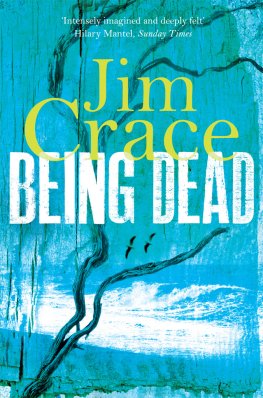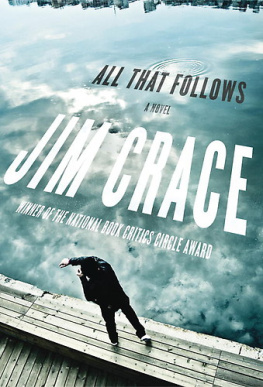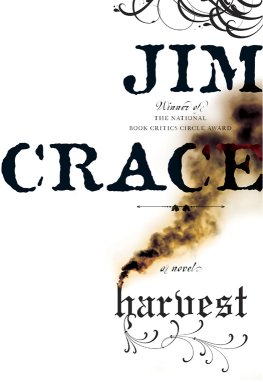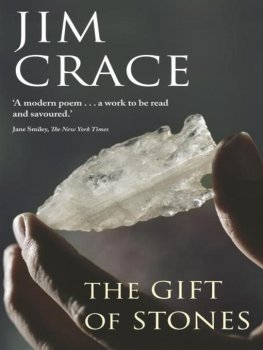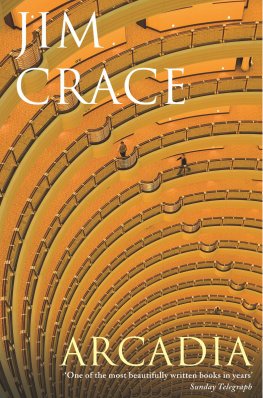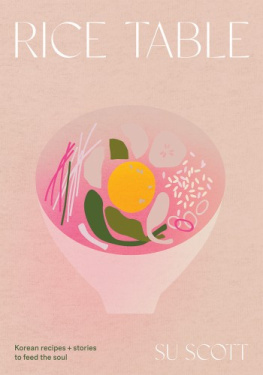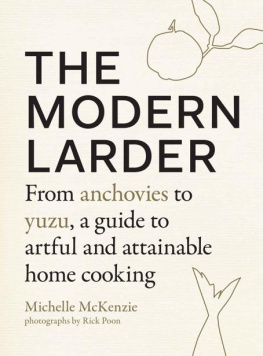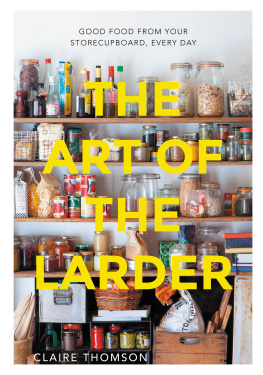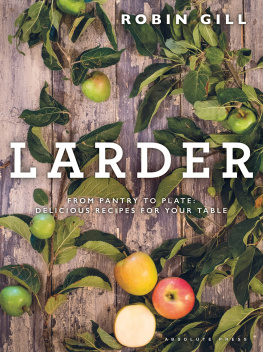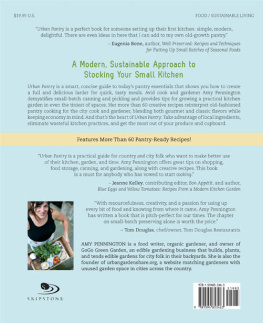Jim Crace - The Devil's Larder
Here you can read online Jim Crace - The Devil's Larder full text of the book (entire story) in english for free. Download pdf and epub, get meaning, cover and reviews about this ebook. year: 2008, publisher: Picador USA, genre: Prose. Description of the work, (preface) as well as reviews are available. Best literature library LitArk.com created for fans of good reading and offers a wide selection of genres:
Romance novel
Science fiction
Adventure
Detective
Science
History
Home and family
Prose
Art
Politics
Computer
Non-fiction
Religion
Business
Children
Humor
Choose a favorite category and find really read worthwhile books. Enjoy immersion in the world of imagination, feel the emotions of the characters or learn something new for yourself, make an fascinating discovery.
The Devil's Larder: summary, description and annotation
We offer to read an annotation, description, summary or preface (depends on what the author of the book "The Devil's Larder" wrote himself). If you haven't found the necessary information about the book — write in the comments, we will try to find it.
The Devil's Larder — read online for free the complete book (whole text) full work
Below is the text of the book, divided by pages. System saving the place of the last page read, allows you to conveniently read the book "The Devil's Larder" online for free, without having to search again every time where you left off. Put a bookmark, and you can go to the page where you finished reading at any time.
Font size:
Interval:
Bookmark:
Jim Crace
The Devil's Larder
1
SOMEONE HAS taken off and lost the label on the can. There are two glassy lines of glue with just a trace of stripped paper where the label was attached. The cans batch number RG2JD 19547 is embossed on one of the ends. Top or bottom end? No one can tell whats up or down. The metal isnt very old.
They do not like to throw it out. It might be salmon not cheap. Or tuna steaks. Or rings of syruped pineapple. Too good to waste. Guava halves. Lychees. Leek soup. Skinned, Italian plum tomatoes. Of course, they ought to open up the can and have a look, and eat the contents there and then. Or plan a meal around it. It must be something that they like, or used to like. Its in their larder. It had a label once. They chose it in the shop.
They shake the can up against their ears. They sniff at it. They compare it with the other cans inside the larder to find a match in size and shape. But still they cannot tell if it is beans or fruit or fish. They are like children with unopened birthday gifts. Will they be disappointed when they open up the can? Will it be what they want? Sometimes their humour is macabre: the contents are beyond description baby flesh, sliced fingers, dog waste, worms, the venom of a hundred mambas and that is why there is no label.
One night, when there are guests and all the wine has gone, they put the can into the candlelight amongst the debris of their meal and play the guessing game. An aphrodisiac, perhaps: Lets try. A plague should they open up and spoon it out? A tune, canned music, something never heard before that would rise from the open can, evaporate, and not be heard again. The elixir of youth. The human soup of DNA. A devil or a god?
Its tempting just to stab it with a knife. Wound it. See how it bleeds. What is the colour of the blood? What is its taste?
We all should have a can like this. Let it rust. Let the rims turn rough and brown. Lift it up and shake it if you want. Shake its sweetness or its bitterness. Agitate the juicy heaviness within. The gravy heaviness. The brine, the soup, the oil, the sauce. The heaviness. The choice is wounding it with knives, or never touching it again.
2
THIS IS FOR the angel, Grandma used to say, tearing off a strip of dough for me to take into the yard. Leave it somewhere he can see. Sometimes I left the strip on the street wall. Sometimes I draped it on the washing line. Sometimes I put it on the outside windowsill and hid behind the kitchen curtain beads to spot the angel in the yard.
Grandma said I wouldnt catch him eating the dough. Thats only greedy birds, she explained. The angel comes to kiss it, thats all, otherwise my bread wont rise. And, sure enough, I often saw the birds come down to peck at our strip of dough. And, sure enough, my grandmas bread would nearly always rise. When it didnt she would say the birds had eaten the strip of dough before the angel had had a chance to prove it with his kisses.
But I never saw an angel on the windowsill. Not even once.
The thought of angels in the yard terrified my girls and so, when we made bread in that same house, but thirty years along the line and Grandma long since gone to kiss the angels herself I used to say, To make good bread I need an angel in the kitchen. Wholl be the angel today and kiss the dough? My girls would race to kiss the dough. Ill not forget the smudge of flour on their lips. Or how, when I had taken the scarred and toppling loaves of bread out of the oven, theyd demand a strip of hot crust to dip into the honey pot or wipe around the corners of the pt jar. This was their angel pay. This was their reward for kissing.
Now there are no angels in the kitchen. Im the grandma and the girls are living far too far away to visit me more than once or twice a year. Im too stiff and out of sorts to visit them myself unless Im taken in a car, but I dont like to ask. I stay in touch with everyone by phone. I keep as busy as I can. I clean, although the house is far too large for me. I walk, when it is warm and dry, down to the port and to the shops and take a taxi back. I keep plants in the yard in pots and on the windowsills. I eat mostly out of a can or frozen meals or packet soups.
This afternoon, I thought Id fill my time by making bread. My old wrists ache with tugging at the dough of what, I think, will have to be my final loaves. I tore a strip off for good luck, kissed it, put it on the window-sill. I warmed the oven, greased the tins, and put the dough to cook on the highest shelf. Now Im waiting at the window, with a smudge of flour on my lips and with the smell of baking bread rising through the house, for the yard to fill and darken with the shadows and the wings.
3
NO ONE is really sure exactly where the restaurant might be, though everyones agreed that the walk to reach it is clandestine and punishing but hardly beautiful. There will be hills and scooping clouds and sulphur pools to menace us. A ridge of little soufrires will belch their heavy, eggy breath across our route. Our eyes will run. Our chests will heave. Well sneeze and stumble, semi-blind, with nothing but the occasional blue-marked tree trunk to guide us on our way.
But still we want to risk the walk. The restaurants reputation is enough to get us out of bed at dawn. We have to be there by midday if we want to get back safely in the light. The five of us, five men, five strangers united by a single appetite.
We take the little taxi to where the boulder track is beaten to a halt by the river, and then we wade into the water and the trees. Were wading, too, of course, into the dark side of ourselves, the hungry side that knows no boundaries. The atmosphere is sexual. Were in the brothels waiting room. The menus yet to be paraded. We do not speak. We simply wade and hike and climb. We are aroused.
The restaurant is like a thousand restaurants in this part of the world: a wooden lodge with an open veranda, and terraces with smoky views across the canopy towards the coast. There is a dog to greet us, and voices from a radio. An off-track motorbike is leaning against a mesh of logs. But none of the twenty tables, with their cane chairs, are as yet occupied. We are, it seems, the only visitors.
We stand and wait. We cough. We stamp on the veranda floor, but it is not until the Austrian, weary and impatient, claps his hands that anybody comes. A woman and a boy too young to be her son. She is well dressed, with heavy jewellery. We would have liked it better if the waiter were a man.
She has bush meats, as wed expect, she says. Some snake which shell kebab for us, some poachers treats like mountain cat, and dried strips of any flesh or glands wed dare to name. She has, she says, though its expensive, parrot meat from a species that is virtually extinct.
What else? To start, hors doeuvres, she has soft-bodied spiders, swag beetles, forest roaches, which taste (according to one of our number) like mushrooms with a hint of gorgonzola cheese. To drink? She offers juice or cans of beer or water flavoured in some unexpected ways.
But we have come as well she knows not for these rare dishes but for Curry No. 3 the menus hottest offering, the fetish of the hill. Back in the town, if Curry No. 2 appears on menus, then its clearly understood that mountain chicken is on offer, thats to say its curried cuissardes of frog. But we are seeking something more extreme than frog, something prehistoric, hard-core, dangerous, something disallowed where we come from. We mean, at last, to cross the barriers of taste.
So she will bring us Curry No. 3 in her good time. It isnt done to ask what she will use for meat, although the boy is eyeing us and could be bribed, with cigarettes, to talk. We simply have to take our chances. There might be lizard in the pot or some unlisted insect, in no book. We are prepared for monkey, rat or dog. Offal is a possibility, a rare and testing part weve never had before, some esoteric organ stained yellow in the turmeric. Tree shark, perhaps. Iguana eggs. Bat meat. Placenta. Brain. We are bound to contemplate, as well, the child who went astray at the weekend, the old man who has disappeared and is not missed, or the tourist who never made it back to her hotel; the sacrificed, the stillborn and the cadavers, the unaccounted for.
Font size:
Interval:
Bookmark:
Similar books «The Devil's Larder»
Look at similar books to The Devil's Larder. We have selected literature similar in name and meaning in the hope of providing readers with more options to find new, interesting, not yet read works.
Discussion, reviews of the book The Devil's Larder and just readers' own opinions. Leave your comments, write what you think about the work, its meaning or the main characters. Specify what exactly you liked and what you didn't like, and why you think so.


